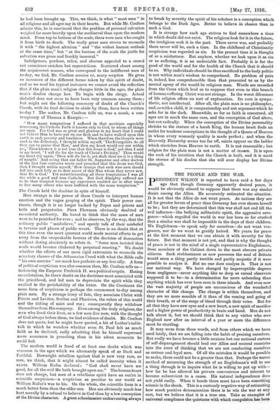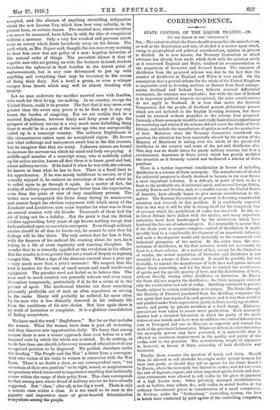THE PEOPLE AND THE WAR.
PRESIDENT WILSON is reported to have said a few days ago that though Germany apparently desired peace, it would be obviously absurd to suppose that there was any similar desire among the Allies. He accurately estimated the situation. It is not that the Allies do not want peace. As nations they are all far greater lovers of peace than Germany has ever shown herself to be ; but they are determined that this war shall not end till the evil influence—the bullying militaristic spirit, the aggressive arro- gance—which engulfed the world in war has been so far crushed that a similar war shall be impossible in the days of their children. We Englishmen—to speak only for ourselves—do not want ven- geance, nor do we want to gratify hatred. We yearn for peace at the first moment that we can obtain it with security for the future. But that moment is not yet, and that is why the thought of peace is not in the mind of a single representative Englishman, from members of the Cabinet down to the most obscure private citizens. Such stubbornness as now possesses the soul of Britain would seem a thing partly terrible and partly majestic if it were possible to analyse it. But no one does analyse it. That is not our national way. We have changed by imperceptible degrees from negligence—never anything like so deep as casual observers supposed it to be—to a determination far more unbending than anything which has ever been seen in these islands. And even now the vast majority of people are unconscious of the wonderful character of this change. The change is within themselves, and they are no more sensible of it than of the coming and going of their breath, or of the surge of blood through their veins. But for all that they have new eyes and a new heart, a new spirit of sacrifice and a higher power of productivity in brain and hand. Men do not talk about it, but we should think that to any visitor who sees England now after an interval of a year or more the difference must be startling.
It may seem from these words, and from others which we have used lately, that we are falling into the habit of praising ourselves. But really we have become a little anxious lest our national custom of self-disparagement should lead our Allies and neutral countries into the error of thinking that we are not conducting ourselves as serious and loyal men. Of all the mistakes it would be possible to make, there could not be a greater than that. Perhaps the surest method of measuring the strength of an Englishman's will to see a thing through is to inquire what he is willing to put up with— how far he has allowed his private convenience and interest to become subservient to a cause. His natural independence does not yield easily. When it bends there must have been something seismic in the shock. This is a curiously negative way of estimating how much positive determination there is to win the war at any cost, but we believe that it is a true one. Take as examples of universal compliance the quietness with which compulsion has been accepted, and the absence of anything resembling indignation about the new Income Tax, which does bear very unfairly, in its present form, on certain classes. The married men, whose sacrifices can never be measured, have fallen in with the idea of compulsion without a murmur. Only a very few crooked and perverse minds raise an outcry which floats harmlessly away on the breeze. The cock which, as Mrs. Poyser said, thought the sun rose every morning to hear him crow was not guilty of a morn hopeless inversion of the natural. order of things. The prevalent silence is that of capable men who are getting on with the business in hand, resolute to reduce the upheaval in their families to the lowest point of embarrassment, but in any case determined to put up with anything and everything that may be necessary in the course of doing their duty. Not a howl, a groan, or even a whisper escapes from hearts which may well be almost breaking with anxiety.
Let no man underrate the sacrifice married men with families, who work for their living, are making. In no country, except the United States, could it be greater. The fact that it may seem even greater than the event may prove it to be does not in any way lessen the burden of misgiving. For we are certain that to a married Englishman, between thirty and forty years of age, the prospect of military service is a very much more forbidding thing than it would be to a man of the same age who was unexpectedly called up in a conscript country. The ordinary Englishman in the circumstances enters upon an unexplored region. He knows not what sufferings and annoyances await him in the dim recesses, but he imagines that they are many. Unknown terrors are bound to increase the nervous tax which his mind and body are paying. A middle-aged member of a conscript army, who is suddenly called up for active service, knows all that there is to know, good and bad, about military service. If he hated it when he was with the colours, he knows at least what he has to face. There is a fixed limit to his apprehension. If he was merely indifferent to service, or if he actually enjoyed it, he endures no torturings of the mind when he is called upon to go through it again. As a matter of fact, the reality of military experience is always better than the expectation, even from the point of view of very unmilitary persons. The writer once accompanied the Swiss Army during its manoeuvres and cannot forget the obvious enjoyment with which many of the Landwehr and Landsturin men came together for what was to them an annual reunion with old friends. Thousands of them had the air of being out for a holiday. But the point is that the British civilian approaching forty years of age knows nothing except that he is embarked upon an uncertain enterprise. Even though military service should be all that its lovers say, he cannot be sure that his feelings will be like theirs. The only certain fact for him is that, with the finances of his ordered life crashing about his ears, he is taking to a life of stern regularity and exacting discipline. No wonder that he is inwardly appalled at the revolution in his affairs. But the wonder is even greater that not a word of despair or repining escapes him. What a sign of the distance covered since a year ago —very much more than a year's measure l We suspect that the trial is hardest for the man of small means and small intellectual equipment. The paradox need not forbid us to believe this. The man used to much comfort can generally tolerate and even enjoy discomfort temporarily, particularly if it be for a cause or in the pursuit of sport. The intellectual likewise can draw something pleasantly profitable out of such an alien experience as serving in the ranks. Misery will probably be suffered far more often by the man who is less distantly removed in his ordinary life from the conditions of his new duties. But here again there is no word of hesitation or complaint. It is a glorious consolidation of feeling everywhere.
We have used the word " Englishmen." But for us that includes the women. What the women have done is past all reckoning, and they discover new opportunities daily. We fancy that among women there is now a nearer approach than ever before to a self- imposed code by which the whole sex is tested. To do nothing, or to do less than one should, is for every woman of education or of any recognized position to be disgraced. We publish elsewhere under the heading " The People and the War " a letter from a correspon- dent who writes of his visits to women in connexion with the War Loan. There is no doubt a class, as our correspondent says, " too uncertain of their own position" to be right, sound, or magnanimous on questions which transcend in importance anything that habitually comes within the range of their petty lives. This class corresponds to that among men whose dread of military service we have already suggested. But " class," after all, is too big a word. There is only a minute class within a class. It is too small to be seen in the gigantic and impressive mass of great-hearted determination everywhere among- the people.































 Previous page
Previous page